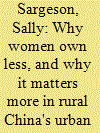|
|
|
Sort Order |
|
|
|
Items / Page
|
|
|
|
|
|
|
| Srl | Item |
| 1 |
ID:
097447


|
|
|
| 2 |
ID:
141901


|
|
|
|
|
| Summary/Abstract |
Recent feminist debate about how to achieve the substantive representation of women in government has been conducted largely in relation to national parliaments in democratic states. This article brings a new perspective by examining grassroots rural government in contemporary China – an authoritarian state, which, however, began implementing village “self-government,” including elections, in 1987. The article draws on qualitative fieldwork in the Chinese provinces of Zhejiang and Yunnan. The authors went into this fieldwork with an understanding that women's substantive representation, democracy, and gender equality are mutually constituted and with an expectation that village self-government might make a much-needed contribution to the achievement of all three. However, we ran into trouble with this analytical framework. First, there were marked variations in villagers’ practices and understandings of “representation.” Second, we found that democracy was not a prerequisite for substantive representation. Third, most villagers we talked with claimed that “men and women are equal” and there was little conception of villagers’ interests diverging by gender. This article explores our analytical “trouble,” with a view to advancing scholarship on constraints to democracy in authoritarian states and suggesting fruitful directions for feminist theorists interested in the relationship between gender, representation and democracy.
|
|
|
|
|
|
|
|
|
|
|
|
|
|
|
|
| 3 |
ID:
114225


|
|
|
|
|
| Publication |
2012.
|
| Summary/Abstract |
This paper examines how debates in the media are providing the discursive conditions for, and thereby giving impetus to, diverse strategies of 'so-called primitive accumulation' in China. Taking as its empirical referent Chinese news and journal articles on land enclosure, the paper analyzes three frames in which policy entrepreneurs craft varying class positions for land-losing villagers. Grounded in different ontological premises, problem diagnoses and recommendations centering on the adoption of either a statist, neo-collective or liberal rural land regime, and backed up by evaluations of local policy experiments, the frames illustrate the diversity of ideational, political and institutional configurations that could facilitate the separation of peasant producers from the land, place land-losing villagers in different relationships with the state and capital, and sustain accumulation. In foregrounding these debates over land-losing villagers' future class positioning, the paper aims to offer a corrective to the historical determinism implicit in contemporary analyses that characterize enclosure in China as simply one national manifestation of homogenous, global neo-liberal projects of 'accumulation by dispossession' or 'gangster capitalism'.
|
|
|
|
|
|
|
|
|
|
|
|
|
|
|
|
| 4 |
ID:
116543


|
|
|
|
|
| Publication |
2012.
|
| Summary/Abstract |
As the amount of wealth in China's economy grows, so too does the size of the gender asset gap. Nowhere is this gap more extreme, or its consequences for women's future wealth, subjectivity, and agency more serious, than in peri-urban sites where the conversion of farmland for development has sent property values skyrocketing. This article explores how the gender asset gap is being reproduced in the course of rural China's urban transformation. It queries the plausibility of the most common explanations for this gap, and suggests that Charles Tilly's theory of categorical sources of "durable inequality" offers a useful corrective to those explanations. Drawing on data collected from interviewees and survey respondents in Zhejiang, Fujian, Hunan, and Yunnan provinces between 2004 and 2012 and from secondary sources, the paper illustrates how, when villagers are compensated for the expropriation of their land and demolition of their agricultural and business activities and housing, Village Committees, patrilineal households, and local government authorities utilise gender categories to resolve distributional problems and differentially compensate men. Women become less likely than men to be acknowledged as, and have the capacity to fully act as, the owners, managers, and users of the assets whose value increases as a result of urbanisation.
|
|
|
|
|
|
|
|
|
|
|
|
|
|
|
|
|
|
|
|
|